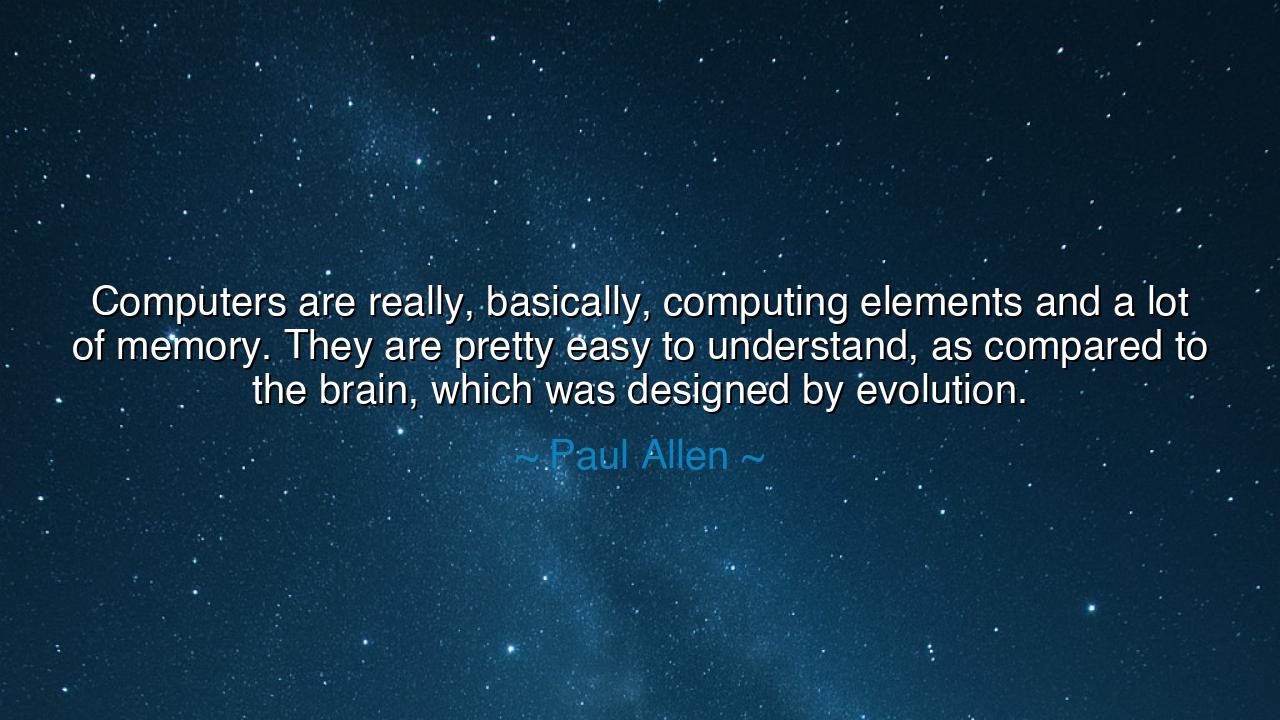
Computers are really, basically, computing elements and a lot of
Computers are really, basically, computing elements and a lot of memory. They are pretty easy to understand, as compared to the brain, which was designed by evolution.






"Computers are really, basically, computing elements and a lot of memory. They are pretty easy to understand, as compared to the brain, which was designed by evolution." – Paul Allen
In the vast tapestry of human achievement, we find that some things are forged by human hands, while others are wrought by the very hands of nature herself. Paul Allen, the great visionary of technology, speaks a truth that echoes through the ages: computers, though complex in their own right, are but humble creations in comparison to the mighty human brain, which has evolved over countless eons. This quote invites us to reflect on the nature of intelligence, both artificial and organic, and to marvel at the intricacy of the mind that can even conceive of machines that mimic its own processes.
Consider the brain—a vessel of such profound complexity that even today, despite our greatest efforts, we are only beginning to unlock its mysteries. It is not a machine of mere calculation but a product of evolution, shaped by forces beyond our comprehension. The brain is the culmination of billions of years of natural selection, an intricate system built not only for logic and reason but for survival, emotion, and understanding. In contrast, computers—though remarkable in their power and precision—are products of human ingenuity, designed with a specific function in mind: to compute, to process data, and to store information. They are bound by the limits of our design, whereas the human mind is a creation of the wilderness, untethered by the confines of mere programming.
The history of human intellect and invention tells us that while we have crafted machines of astounding capacity, there is no comparison to the infinite potential of the human mind. One need only look at the story of Leonardo da Vinci, a man whose genius spanned the realms of art, science, and engineering. He, too, marveled at the human mind, seeing it as the ultimate machine—capable not only of reasoning but also of feeling, creating, and dreaming. Unlike the cold precision of a machine, the human mind is ever-evolving, constantly adapting to the changing tides of experience and emotion.
The quote by Paul Allen beckons us to acknowledge the true wonder of evolution’s work, and to recognize that computers—as powerful as they are—are only reflections of a system that cannot yet replicate the richness of the human mind. Artificial intelligence, in its nascent form, might mimic the functions of the brain, but it lacks the depth of consciousness and self-awareness that the human mind possesses. The brain, a product of millennia of evolution, is far more than just a collection of memories and computational elements. It is an organ of growth, a mechanism that adapts, learns, and forms new patterns of understanding with each passing day.
As we look at the rise of technology and the increasing presence of computers in our lives, we must remember this humbling truth: while we have created machines to serve our needs, they are nothing in comparison to the mind that gave birth to them. The mind that designed the first computers, like those of Alan Turing, was itself an expression of evolutionary genius—a mind capable of contemplating the very essence of intelligence and creating machines that could emulate parts of it.
And so, the lesson to be drawn from Paul Allen's words is one of humility and wonder. While we must celebrate our progress in the world of technology, let us not forget that the greatest machine of all is the one that resides within our very selves. Let us cultivate that mind, respect its potential, and never lose sight of the fact that the true marvel of existence lies not in the machines we create, but in the minds we nurture. In the end, it is our own capacity for growth, understanding, and evolution that will determine how we use the machines of our making. Let us wield them with wisdom, knowing that while they may assist us, they are no match for the mysteries of our own minds.






AAdministratorAdministrator
Welcome, honored guests. Please leave a comment, we will respond soon